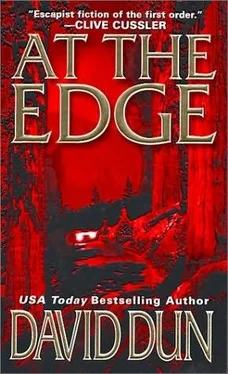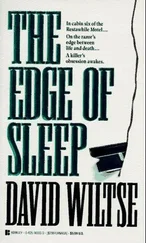David Dun - At The Edge
Здесь есть возможность читать онлайн «David Dun - At The Edge» весь текст электронной книги совершенно бесплатно (целиком полную версию без сокращений). В некоторых случаях можно слушать аудио, скачать через торрент в формате fb2 и присутствует краткое содержание. Жанр: Триллер, на английском языке. Описание произведения, (предисловие) а так же отзывы посетителей доступны на портале библиотеки ЛибКат.
- Название:At The Edge
- Автор:
- Жанр:
- Год:неизвестен
- ISBN:нет данных
- Рейтинг книги:3 / 5. Голосов: 1
-
Избранное:Добавить в избранное
- Отзывы:
-
Ваша оценка:
- 60
- 1
- 2
- 3
- 4
- 5
At The Edge: краткое содержание, описание и аннотация
Предлагаем к чтению аннотацию, описание, краткое содержание или предисловие (зависит от того, что написал сам автор книги «At The Edge»). Если вы не нашли необходимую информацию о книге — напишите в комментариях, мы постараемся отыскать её.
At The Edge — читать онлайн бесплатно полную книгу (весь текст) целиком
Ниже представлен текст книги, разбитый по страницам. Система сохранения места последней прочитанной страницы, позволяет с удобством читать онлайн бесплатно книгу «At The Edge», без необходимости каждый раз заново искать на чём Вы остановились. Поставьте закладку, и сможете в любой момент перейти на страницу, на которой закончили чтение.
Интервал:
Закладка:
"What did she say?"
"She said, 'This time, dear, I think you really fucked up.' I had friends in Alaska, a married couple, in Fairbanks."
Fairbanks was twenty degrees below zero on the November night that Maria arrived. Fortunately, she had the presence of mind to shop in Anchorage and get outfitted with insulated boots, gloves, a parka, and heavy sweaters. Even with all the trappings, the cold still cut through her, made her bones ache, and pretty much pushed her indoors every moment she could get near heat. Standing only moments in the still night air, she took a cab to 2640 Lambert. It was a nice house, Sam Nehi was the manager of a wholesale petroleum outfit, the head of the local office, and Margi, his wife, was a homemaker. They welcomed Maria with open arms.
Quickly she found a cabin and a job tending huskies for a man named Cotter, whose hobby was racing dog sleds. Her cabin was near the dogs, their yelping, their smell, their food, and their droppings. It was 22'xl4', all one room, no running water, a good woodstove, kerosene lanterns, an outhouse if you could stand it, a bucket if you couldn't.
There was a sturdy pine table, four chairs, a small sofa, and a brass bed, with a mediocre mattress. Oddly, she found it satisfactory.
Within two weeks she had enrolled in a correspondence law school. In the mornings she tended the dogs, exercised them, groomed them, doctored them, and fed them. Afternoons and evenings she studied.
Cotter was a good man, ran his own feed store, and was greatly amused at the sprightly, well-educated young woman who came out of nowhere to tend and eventually race his dogs. She could mush the dogs as well as any woman around and was better than most of the men.
Cotter had two homes, one in town where he spent most nights, and one near Maria's cabin at Cotter Hollow. The reason for the town house was that it was not easy to get to Cotter Hollow and once you got there you found nothing but Cotter's compound. In winter, access was by snowmobile and cross-country ski. Unless she was hauling supplies, Maria preferred the skis. It was twenty minutes of hard work to get to the parking lot and the four-wheel-drive Cherokee she ultimately acquired out of her meager wages and some money that her mother required her to accept. Her father wasn't allowed to require anything.
On all the holidays that Maria could get away for, she went home to visit. Barely speaking to her father, she maintained a rigorous chilly formality that thawed by fractions of a degree with each visit. Her mother was dismayed but stayed out of it.
Just after Maria passed the California bar exam, days before she was due to leave Alaska for the offices of Patty McCafferty, something happened. During the almost three years that Maria lived at Cotter Hollow, she had come to know the Prestons. They lived in a beautiful and grand log house situated adjacent to the trailhead to Cotter Hollow, where Maria parked her car in one of Cotter's three garages. Maria, who had a natural affinity for kids, got to know Amy Preston on short winter visits over hot chocolate.
Amy's father was a trapper who never ran a line or stretched a pelt. Her mother called herself Sarah Preston (although her native name was different and mostly unpronounceable) and was a successful weaver who made custom blankets that were really art.
Maria arrived several times a week at the Preston home on her skis. In front of Cotter's nearby garage, she would remove her skis, load them onto her Jeep Cherokee and — with a heater efficient enough to raise the temperature slightly above freezing on a cold day — drive to Fairbanks with something less than a certain conviction that she would make it.
Passing the Preston house day after day on her way to town, Maria became familiar with the place: when the lights came on in the morning and went off in the evening, that Thursday was garbage day, that Mr. Preston heated the engine blocks on the cars at about 6:00 on those mornings when he wasn't alcoholically incapacitated, that Mr. Preston usually shoveled snow on Saturdays when the inebriation exception didn't apply — and in that event he waited until Sunday.
Eventually she got to know Mrs. Preston and her beautiful blankets, and the story of Mr. Preston before he became a morose drunk. One late evening, as she passed by the Pres-tons', she noticed the house dark except for a shimmering strange light in the windows. And she thought she heard a cry. Shuffling closer on her skis, she became certain of the sound and rushed to the front steps.
There by the side of the steps, frozen solid in a dirty T-shirt, bottle still clenched in an icy hand, was Mr. Preston — stone dead. She threw off her skis and dashed to the heavy oak front door. It was locked. Through the window she saw that the dancing light was a roaring fire. Maria took a flying leap through the living-room window; protected by her thick parka, she landed on the inside floor unscathed.
"Is anyone here?" she screamed.
Amy appeared at the top of the stairs, shaking and screaming long screams, her hair wild and mussed, holding out her arms as if she wanted to be picked up. The stairway was an inferno. Unlocking the front door, Maria ran back outside, only to be chased by flames looking for oxygen. Hoping to contain the fire, she slammed the door. A ladder, a tree, she couldn't think. There was no way up. Over the front porch was a slanted roof, above that roof a window. There was no way to make it to the roof. "God help me," she muttered, desperate, the little girl's face filling her mind.
Then she saw her semifaded red Cherokee. Running through the knee-deep snow on the walkway, she made it to the Jeep, jumped in, and drove for the front porch. Pushing the wheels up the steps, she drove until the front end of the vehicle was a foot from the front door. By climbing onto the top of the Jeep cab, she was able to pull herself atop the porch roof and dive through a window into the master bedroom.
Flames were everywhere. Her parka caught fire and she yanked it off while staying flat on the floor. Crawling forward, she found the door, the hallway, the top of the stairs. Amy lay unconscious, the smoke thick and dirty. Maria hadn't bothered to breathe and was running out of air. Grabbing the little girl, she got out of the house by leaping from the second story into a snow bank. But not before a falling timber had caught her midriff and burned in a permanent six-inch scar across her belly.
"I showed you mine," Dan said as she completed her story. They had bedded down on the two family-room couches that nearly converged in an L shape. His head was a couple feet from hers.
"What do you mean?"
"I spilled my guts; you should show me your scar so I can tell you it isn't a big deal."
"I'm not showing you my scar."
"You want to."
"Go to sleep, Dan."
They were in the bowels of a USC science lab in the section devoted to zoology. The large, somewhat haphazard work space lay under a maze of old pipes wrapped in something that looked like plaster-cast material. Evidently, the bat people weren't graced with the best digs. Dr. Michael Sanford welcomed them into his office and brought out the photos.
"We'll start with the bat. There are about one hundred species of bats that we know of. Nearly one quarter of all mammal species worldwide are bats." His eyes glistened with enthusiasm. "Bats belong to the order Chiroptera. But they defy generalization because their dietary habits and habitats vary so widely. Now this fellow here looks like a hoary bat. Notice I said 'looks like.' He isn't quite. Coloring around the neck is a little different. I had to do quite a bit of comparing to figure that out. Almost classifies as a subspecies. It's always exciting to find something new." He sighed and took off his glasses. "I don't suppose you know where I could get a carcass?"
Читать дальшеИнтервал:
Закладка:
Похожие книги на «At The Edge»
Представляем Вашему вниманию похожие книги на «At The Edge» списком для выбора. Мы отобрали схожую по названию и смыслу литературу в надежде предоставить читателям больше вариантов отыскать новые, интересные, ещё непрочитанные произведения.
Обсуждение, отзывы о книге «At The Edge» и просто собственные мнения читателей. Оставьте ваши комментарии, напишите, что Вы думаете о произведении, его смысле или главных героях. Укажите что конкретно понравилось, а что нет, и почему Вы так считаете.












